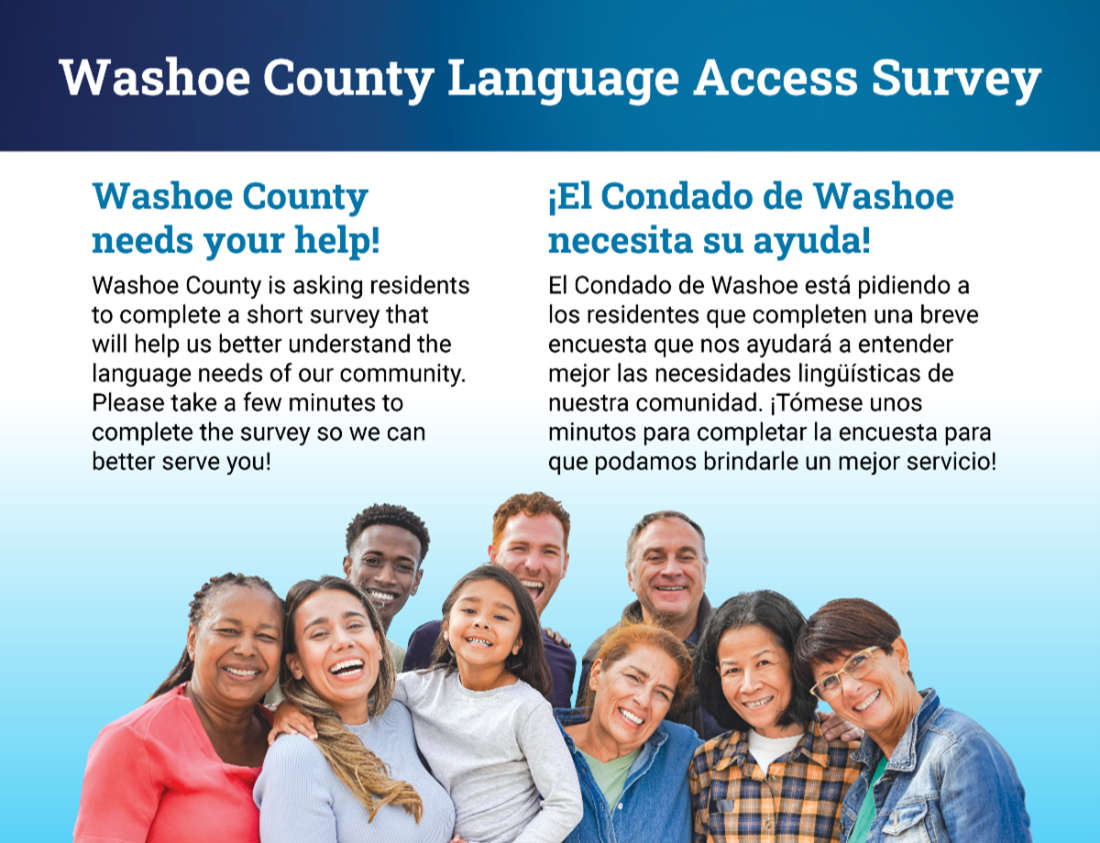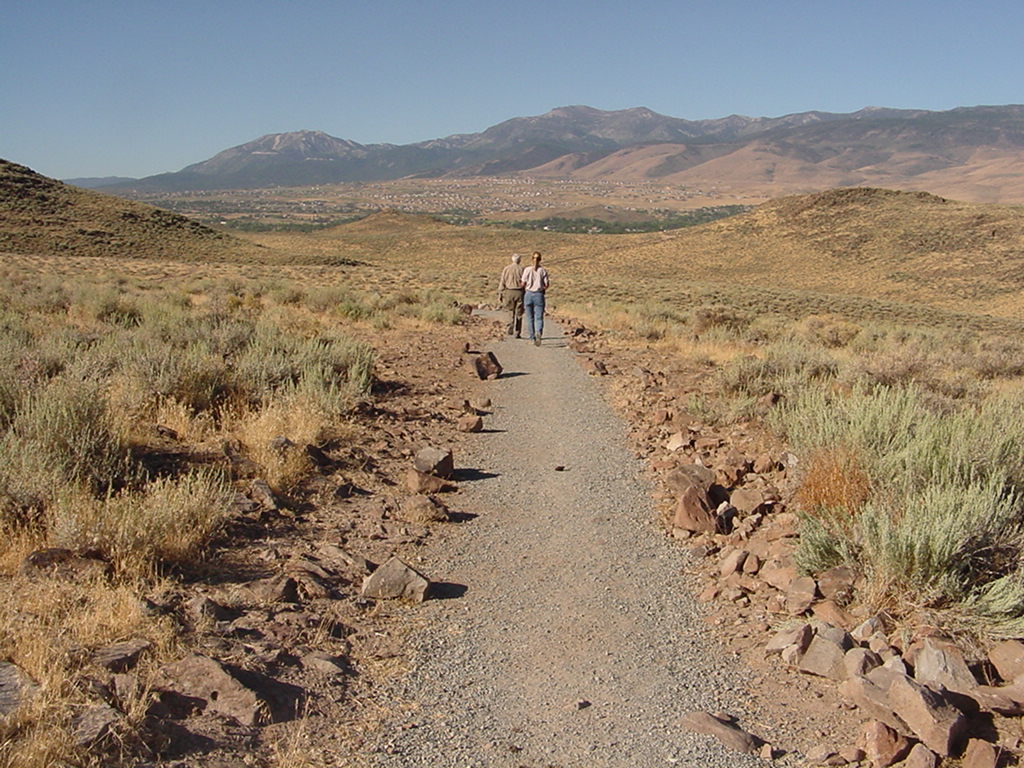welcome letter from washoe county commission chair, alexis hill

Washoe County Commission Chair, Alexis Hill
As we experience the beginning of spring I have been reflecting on rebirth and new beginnings. I cannot wait to get in the garden and spend more time outside in our beautiful region. I think that there are so many things to be thankful for in our community. We may not all agree on every policy, but we can agree that Washoe County is an incredible place to live and strive to make better. We have all been watching negative and dangerous dialogue happen in our community and I believe that we can do better, by treating each other with dignity and assuming good intent, even with disagreement. The County has embarked on adopting the Dignity Index to challenge us to have better public dialogue. We can make better decisions when we ask questions instead of holding contempt for people who disagree with us. I challenge all Washoe County residents to try to help our community by treating everyone with dignity. We can unify our community and county while committing to dignified discourse.
Take the Dignity Pledge today: As an American who knows and loves my country, I am convinced there is no America without democracy, no democracy without healthy debate, and no healthy debate without dignity; therefore, I pledge to do more to treat others with dignity, not contempt.
common scams targeted at senior citizens – and how to avoid them
In February, Washoe County welcomed City of Sparks attorney Wes Duncan who shared information about the latest scams targeting seniors and the steps we can take to protect ourselves. Nearly 100 seniors participated in the event with some sharing personal experiences of being conned, which sadly isn’t surprising. According to AARP BankSafeInitiative, the rate of elder financial exploitation has more than doubled since March of 2020. Even if you couldn’t make it to the seminar, here are some of the top tips from Mr. Duncan on what to look out for and how to protect yourself and those you care about.
Scams can come from anywhere: online, on the phone, through the mail and in person, and can come from strangers or those you trust. We don’t share this to scare you; we simply want you to be cautious about trusting anyone with your personal financial information.

Common scams can include:
- Romance scams – we all want to find love, but be cautious who you send money to.
- Debt collection scams – angry phone calls at odd hours or pressuring you to give money immediately should throw up a red flag.
- Technology support scams – don’t allow access to your personal devices, whether that be in person to someone you don’t know, or giving access online.
- Government impersonation scams – the IRS will never call you and place pressure on you to provide money or personal information.
- Grandparent-targeted “emergency” scams; for instance, you receive an emergency phone call to send bail money from a person posing as a grandchild.
- Email or text message scams – be careful what you click.
- Lottery or sweepstakes scams – you should not have to output money in order to receive an award.
Be sure to monitor your bank and credit card accounts and to be careful about shredding documents with personal information on them. Be wary of door-to-door salespeople or those offering repairs; consider carefully who you allow into your home. Are they licensed? What do their online reviews say? Do your homework today to save yourself from heartache tomorrow.
There are too many ways that clever scammers are targeting people to list here. A good rule of thumb is to simply be cautious and take your time. Don’t allow anyone to pressure you into signing anything or giving personal or financial information in the moment if you feel uncomfortable. If you’re unsure, hang up and contact the organization directly. As the old adage goes, it is better to be safe than sorry.
mythbusters: foster care edition



Foster care remains a topic shrouded in misunderstanding and misconceptions. These misconceptions often overshadow the profound impact foster care has on the lives of children and families involved. It’s time to shed light on some of the most prevalent misunderstandings and offer a clearer understanding of the reality of foster care. Click the “Read More” button to learn about the most common myths and facts about foster care.
Read more
MYTH: YOU HAVE TO BE MARRIED TO BE A FOSTER PARENT
FACT: Washoe County needs diverse foster parents, to meet the diverse needs of the children and families we work to serve. You can be single, married, in a partnership but not married, identify with the LGBTQIA+ community, or have a partner with the same gender to be a foster parent. Washoe County does not discriminate based on sexual orientation, age, race, or gender identity.
MYTH: YOU HAVE TO BE WEALTHY AND/OR OWN MY OWN HOME TO BE A FOSTER PARENT
FACT: During the application process, licensing workers will confirm your finances and cover your current cost of living. Washoe County Foster parents are provided with a daily reimbursement rate per child, which is distributed monthly. This reimbursement rate does not get added to your annual income and is not taxable. This money is intended to help alleviate some of the costs associated with caring for a youth in foster care. Families who adopt may also receive a post adoption subsidy. There is an additional daily rate increase, for specific children with a higher level of needs.
You can qualify to be a foster or adoptive parent if you are a homeowner or renter. You can live in a house, apartment, condo, mobile home, duplex, townhome, etc.
MYTH: FOSTER CARE AND ADOPTION ARE THE SAME THINGS
FACT: There are distinct paths for families interested in supporting youth in foster care. Family foster care licensure focuses on providing a nurturing environment for children with the goal of reunification with their birth families. Some children, unable to reunify, may be considered for adoption within their foster homes. Did you know that there are even different types of foster care? Find out here.
Alternatively, adoption-only licensure is available for those solely interested in adopting. These applicants undergo training in trauma-informed care and grief and loss associated with adoption. Following completion of the application process and home study, they can inquire about children available for adoption or legal-risk youth in need of permanency. Families matched with legal-risk youth must update their license to include foster care. Adoption-only families may foster a legal-risk youth before finalizing adoption if the child becomes available.
MYTH: FOSTER CARE AND ADOPTION ARE TOO DIFFICULT TO NAVIGATE
FACT: Foster and adoptive families receive comprehensive support through a network of peers and staff. Upon licensing, each foster parent is paired with a Peer Support Parent (PSP), a licensed foster parent coach who offers guidance and assistance throughout the journey. PSPs help navigate various aspects, from accessing necessary support before welcoming the first child, to navigating the agency and court system. Additionally, there are in-person support groups, social media communities, and ongoing support from foster parent liaisons. Our Recruitment Team provides information and answers questions to applicants at the beginning of the process. With this wraparound support, foster and adoptive families are never alone in navigating the system!
MYTH: I CAN’T MAKE A DIFFERENCE
FACT: With over 600 youth in foster care and not enough homes to care for these youth, every single new home makes a difference in the life of a child and allows them the opportunity to feel safe in a family home environment. Every new family who becomes licensed gives a chance to siblings who may have been separated, by providing a home that may bring them back together. As a foster parent, you play a significant role in the life of a youth in foster care by providing consistency, advocating for their needs, affirming them, and helping them understand their emotions and how to navigate and process their circumstances. By modeling what it means to be a safe and supportive care giver, you will help the youth develop resiliency. Many birth families need the support of foster parents as well, and they may look to you for guidance through this process as well.
For people interested in growing their family through adoption, the difference you can make in the life of a child is giving them a family and safe home. Many of our youth spend years in foster care, and these children long to have a family of their own.
MYTH: THERE ARE NO RESOURCES AFTER I BECOME A FOSTER PARENT
FACT: In addition to Peer Support Parents, foster care reimbursement, and Medicaid coverage, our agency has placement support specialists who are available to provide support as needed. Our team ensures your questions are being addressed and you have the resources needed to care for the youth in your home. Additionally, intervention and support services may be available to work with your youth in your home, depending upon the youth’s needs, or support you as caregivers. There are a variety of resources to meet the youth’s needs, as well as the needs of the resource families.
MYTH: I CAN’T BE A FOSTER PARENT, AS I’LL GET TOO ATTACHED
FACT: Some people fear they will get too attached to a youth; however, attachment helps you to be the nurturing caregiver that the youth need and deserves while they are separated from their family. For most foster parents, the work a foster parent does has many rewards. The act of helping a family reunify can be incredibly rewarding. Some people stay in touch with their foster youth after they have reunified. The youth in foster care are incredible, and it is easy to become deeply connected and concerned for their well-being. Attachment goes hand in hand with quality parenting.
MYTH: YOU NEED PARENTING EXPERIENCE TO BE A FOSTER PARENT
FACT: While having parenting experience can be beneficial, many of our foster and adoptive parents have never parented before. Youth in care have unique needs that come from being exposed to trauma. There are parenting groups, ongoing training supports, and specialists available to answer questions, and model routines, on top of the trauma informed pre-service training. Each child is unique in their needs and abilities. Through time, you can become the expert parent for the youth in your home, even if you have never parented before.
MYTH: I CAN’T TRAVEL WITH A YOUTH IN FOSTER CARE
FACT: We encourage foster parents to take the youth in foster care along for family trips and vacations. Arrangements can be made to authorize the youth to be able to travel with their foster parent(s) outside the county, state, or sometimes country.
MYTH: I HAVE A CRIMINAL RECORD, SO I WON’T BE ABLE TO QUALIFY
FACT: Recruiters meet with applicants individually at the onset of inquiry, to answer any questions or concerns the prospective foster or adoptive family may have. This is the best time to discuss previous criminal convictions. While there are some criminal charges that prevent people from moving forward in the process, there are situations where people with past criminal charges can become licensed. This is always determined on a case-by-case matter, so please reach even if you think you may not qualify.
As we debunk the myths surrounding foster care and adoption, one truth emerges: every individual can make a profound difference in the life of a child. So, if you’ve ever doubted your ability to foster or adopt, it’s time to reconsider. Because in the end, it’s not about meeting unrealistic standards—it’s about providing love, stability, and a chance for a brighter future to a child in need.
take the language access survey and help us to improve our communications
Please take this Language Access Survey so we can better communicate with our residents.
Are you on Facebook? We have an active Spanish-language Facebook page in addition to our English page. Follow Condado de Washoe, Cobierno de Nevada on Facebook to receive our social media news in Spanish.

Enjoy a walk on the wild side this spring in
Washoe County open space and trails

https://www.washoecounty.gov/parks/trails/rules_etiquette/index.phpTake a walk on the Washoe wild side this spring. Washoe County manages over 12,000 acres including over 10,000 acres of open space, 49 parks, an Arboretum, developed trails, trailheads, athletic fields, golf courses, a campground, a shooting facility, an archery facility, a museum, and so much more!
Download the Truckee Meadows Trails guide before heading out the door. This handy booklet provides maps and information for dozens of trails located in the Reno, Sparks, North Tahoe area. Scroll through the guide for inspiration, or download the Washoe Life podcast episode featuring Washoe County’s Trail Program Coordinator Christina Thayer. She shares safety tips, info on her favorite hikes, and some news on the future for trails in Washoe County.
No one wants to be “that guy”… be sure to check out the Trail Etiquette page on our website so all trails are happy trails.
It’s nearly event season in northern Nevada, and Washoe County’s parks, gardens, community centers, and outdoor space can be reserved for parties, picnics, festivals, camping, and more. Be sure to check out the deadlines and how to apply for permits at www.washoecounty.gov/csd.
Navigate emergencies confidently by making a family plan
for when disaster strikes



In Northern Nevada, Emergency Management has noted 13 identified hazards for our area and consistently trains, prepares, and mitigates against these risks.
As residents, we should do the same by preparing ahead! Emergency planning is not just about having supplies but creating a clear strategy ensuring the safety of all members. Before disaster strikes, families should convene to discuss potential hazards, community protocols, community resources, educate every member about dangers, and how to react if separated during a warning.
Key components of that discussion could include:
- Types of Hazards, Warnings, & Responses: We’ve all heard of “stop, drop, and roll”, but does everyone in the household recognize the sound of a smoke alarm? What if an earthquake happens? Are you in a flood zone? Gather to discuss hazards and responses, ensuring everyone understands the risks and necessary actions.
- Escape Routes: Draw floor plans marking at least two escape routes from each room. Post these plans at eye level for easy reference during emergencies.
- Evacuation Plans: Familiarize yourselves with evacuation routes within your own neighborhood, keep a full tank of gas, and plan transportation arrangements.
- Meeting Places: Establish local and distant meeting places for safe reunions in the event of an emergency.
- Family Communications: Develop a communication plan, complete contact cards, and designate an out-of-state contact for coordination.
- Safety Skills: Family members with essential safety skills can be lifesaving during emergencies. Training in first aid, CPR, and fire extinguisher usage ensures that individuals can respond effectively in crisis situations.
Read more
- Go Bag: Prepare a “go bag” for each family member containing essential items such as water, non-perishable food, a flashlight, appropriate clothing, batteries, a first aid kit, a multi-tool, a blanket, and any necessary medications. Don’t forget to include items specific to individual needs, such as air tanks or specialized medical supplies. Although it is understandable that you would not be able to overstock on medical supplies, having an empty prescriptions bottle or an order for an air tank will ensure that agencies like the Red Cross can obtain those items for you in an emergency.
- Other Considerations: Your family and your situation are unique. Remember, in an emergency, it’s not the time to figure out one-off considerations for your family; planning ensures everyone’s safety and well-being:
- Pets/Livestock: Our furry family members should not be overlooked! Families should prepare emergency supplies for pets and proper identification, in the event of separation. Larger animals need additional consideration for transportation needs and shelter.
Unfortunately, hazards/emergencies are mostly unpredictable, but by creating a comprehensive plan addressing all aspects of family safety, Washoe County individuals and families can navigate emergencies confidently. Start planning today to protect what matters most. For more information on what to expect in an emergency, visit Washoe County Emergency Management’s Response webpage: https://www.washoecounty.gov/em/response/index.php.
celebrate 50 years of supporting troubled youth in our community

Help us celebrate the 50th anniversary of the Jan Evans Juvenile Detention Center! Juvenile Services provides help to the most vulnerable of Washoe County’s residents: youth facing detention. The goal of the center is a safe place for rehabilitation and growth. Last year, the Washoe County Leadership Academy partnered with Sierra Arts Foundation to bring art therapy classes to the youth at the center.
Stay tuned this spring as we bring you stories of people who worked and lived at Jan Evans over the years. These interviews will be featured on the Washoe Life podcast, and on social media.
And just in time for her birthday, the Jan Evans center will be getting some fresh turf for youth housed there to run and play on. This $300,000 Capital Improvement Project is being paid for by cross-fund budget appropriation, which means that savings from elsewhere will pay for it and create a net-zero impact on the budget. However, we think it will impact the youth housed there immensely.
Make room for grandma

Accessory Dwelling Units, Granny Flats, Mother-in-Law Quarters… by any name, they are now approved in Washoe County
This March, the Board of County Commissioners passed an ordinance amendment relating to accessory dwelling units (ADUs), which are also known as “granny flats” or “in-law suites.” The updated ordinance will align county code with state law, which was updated in the 2023 legislative session, and with the County’s strategic plan to make housing more attainable.
Having identified housing supply and affordability as key priorities during the Envision Washoe 2040 master plan update, the Board voted in alignment with the County’s strategic plan which called for making planning and permitting easier, removing unnecessary housing barriers, the creation of incentives to spur affordable housing, and a broader range of housing types in unincorporated areas, such as ADUs. With median home prices in Washoe County outpacing median home income, unincorporated areas of our community are anticipated to be the home for many over the next two decades, necessitating creative thinking to accommodate more families.
One source of attainable housing can be ADUs, which provide a unique housing option that enables various living arrangements for county residents, including multi-generational living, caretaker’s residences, low-cost rentals, and more. Thinking about adding an ADU to your property? Things just got a lot easier for planning purposes. Living next to your in-laws? We will abstain from a vote in that arena.
